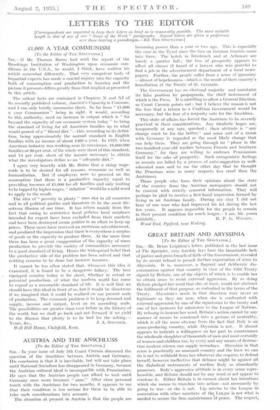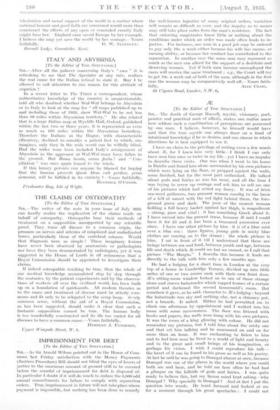GREAT BRITAIN AND ABYSSINIA
[To the Editor of THE SPECTATOR.]
SIR,—Mr. Brian Leighton's letter, published in time last issue of The Spectator, very forcibly lays bare the lamentable lack of justice and gross breach of faith of the Government, revealed by its recent refusal to permit further exportation of arms to. Abyssinia. It is, moreover, a flagrant and deliberate dis- crimination against that country in view of the 1930 Treaty signed by Britain, one of the objects of which is to enable her to obtain arms to resist externals aggression. By so doing. Britain pledged her word that she, at least, would not obstruct the fulfilment of that purpose, as embodied in the terms of the Treaty. Abyssinia's needs in that direction were never so legitimate as they are now, when she is confronted with external aggression by one of the signatories to the treaty and one of her sponsors for admission to the League of Nations.' By refusing to honour her word, Britain's action cannot by any manner of means be construed into a gesture of neutrality,' which is all the more obvious from the fact that Italy is an arms-producing country, while Abyssinia is not. It almost appears to indicate a willingness on her part to countenance the wholesale slaughter of thousands of men and most certainly of women and children too, by every and any means of destruc- tion modern science can supply nowadays. Abyssinia in that sense is practically an unarmed country and the least we can do is not to withhold from her whatever she requires to defend herself, however ineffective that defence might be against all. the diabolical instruments of warfare Italy so abundantly" possesses. Italy's aggressive attitude is in every sense repre-' hensible, and Britain should not by any word or act appear to condone it. Either Britain is in earnest about her intentions' which she means to translate into action—not necessarily by going to war—or she is not. Lip service to the League in association with other members of the *League is not what is needed to secure the firm maintenance of peace. The respect,'
admiration and moral support of the world-in a •inatter where national honour and good faith are concerned would more than counteract the effects of any open or concealed enmity Italy might bear her. England once saved Europe by her example. I believe she may yet save the world 'by her courage.--Yours
faithfully, D. W. STANDLEY. Bongoll Lodge, Greenhithe, Kent.







































 Previous page
Previous page